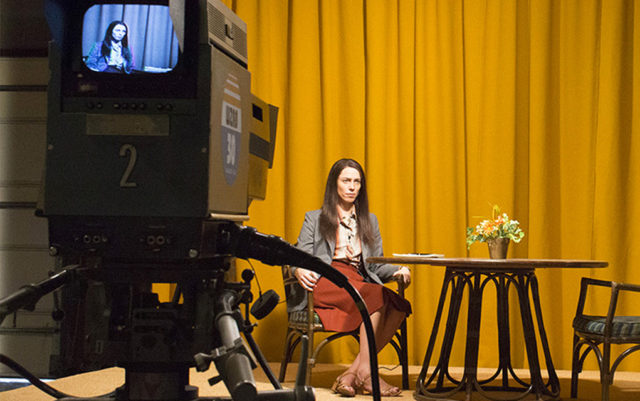
Human beings are creatures of sight. What we judge as real is commonly based on what we see and how we see, but there is a third aspect to sight: why. Why must we see? To believe? To understand? Because we are curious?
Furthermore, capturing that truth with a camera is no easy feat. Every image presented for an audience has, by its nature, some level of composition, some level of selection to it. The same goes for the choice presented to the audience; you are choosing to watch this and not that. Sometimes we watch seeking distraction, other times we watch seeking edification, but every time we watch we are seeking something. That something forms the thematic and critical crux of Christine, a bio-pic about a Sarasota, Florida, news reporter and the infamous decision she made on July 15, 1974.
Rebecca Hall stars as Christine Chubbuck, the 29-year-old reporter who wanted to present hard-hitting news in a time where “if it bleeds, it leads” started taking over. Looking back from a 21st-century vantage point, it is clear that Chubbuck had some forms of social anxieties and clearly battled depression, but Hall plays Chubbuck more frustrated than depressed. Frustrated that she lives with her boozy mother who always has a guest over. Frustrated that she isn’t getting the stories she wants. Frustrated that the hunky anchor (Michael C. Hall) is getting the Baltimore promotion and that the little tart (Kim Shaw), who is going with him, is just a little bit younger, a little bit perkier and a little bit more the person Christine wishes she could be.
Christine Chubbuck was a real person and if that name doesn’t exactly ring a bell, then a major spoiler is to follow. What Chubbuck is famous for, and why we are watching this movie, is that Chubbuck committed suicide on air. Chubbuck even requested the morning’s broadcast be taped — not common practice — she wanted her death to be public.
But giving away Christine’s ending isn’t really a spoiler. This is not the type of movie we watch to see what happens; we watch in hopes of comprehending what happened. In an odd turn of synergy, Christine wasn’t the only movie to come out this past year about Chubbuck’s public suicide. The other, Kate Plays Christine, is a documentary from Robert Greene and focuses on Kate Lyn Sheil’s preparation to play Chubbuck in a movie about her life. Of the two, Kate Plays Christine posits more questions about why filmmakers would tell such a story and why an audience would want to see it. Christine does too, but in a much more subdued manner. Director Antonio Campos works in tandem with Hall to present a doom-laden portrait of a frustrated woman, a disturbed woman, a woman under the influence of a time and place. It may be written, it may be acted, directed and edited, but there is an unmistakable truth behind the camera. Maybe that is why we watch; we’re looking to understand something we don’t.
On the Bill: Christine. Jan. 25–28. The Boedecker Theater, The Dairy Arts Center, 2590 Walnut St., Boulder, 303-440-7825, thedairy.org. International Film Series. 7:30 p.m. Wednesday, Feb. 1, Muenzinger Auditorium, University of Colorado Boulder, internationalfilmseries.com.














